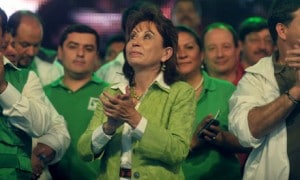Latin America’s former first ladies bid to break macho presidential mold
June 14, 2011
 By Rory Campbell for The Guardian – Hillary Clinton failed to make the transition, but former first ladies across Latin America are following in her footsteps and campaigning to become presidents, in what may become a fresh wave of female heads of state in the region.
By Rory Campbell for The Guardian – Hillary Clinton failed to make the transition, but former first ladies across Latin America are following in her footsteps and campaigning to become presidents, in what may become a fresh wave of female heads of state in the region.
Former “primeras damas” in Guatemala, Honduras and Argentina have waded into traditionally macho Latino politics in the hope of staying in, or returning to, presidential palaces.
Their ambitions have provoked excitement and controversy, with supporters acclaiming a breakthrough for women – and critics concerned at the prospect of entrenched political dynasties.
In Guatemala, Sandra Torres divorced her husband, President Alvaro Colom, in order to run in September’s election and circumvent a constitutional ban on relatives succeeding an incumbent. “I am getting married to the people,” she tells rallies.
Some first ladies are depicted as proxies for husbands constitutionally barred from running again – but not even her harshest critics accuse Torres, 56, of that. She was widely viewed as the dominant character in the marriage and built up a political base while heading the government’s anti-poverty programmes.
The Catholic church condemned the divorce, saying the institution of marriage was not negotiable, and election rivals called it electoral fraud. Otto Perez, a retired general who leads her in the polls, mockingly calls her “señorita” rather than “señora”.
In Honduras, Manuel Zelaya, a former president ousted in a coup and freshly returned from exile, has tipped his wife Xiomara Castro to succeed him.
“The one who is engaged in politics is the first lady, I’m just a simple citizen,” he told a news conference.
The announcement delighted supporters who were frustrated that Zelaya is constitutionally barred from standing again. The former first lady hinted she was ready to run. “Before the coup, I always thought that once the term finished, I would return to the house and dedicate myself to my family,” she told AFP. “But I have talked about it with my children and things have changed.”
Argentina’s Cristina Kirchner, who succeeded her husband Nestor in 2007, is expected to win a landslide re-election in October thanks to a robust economy, a fractious opposition and sympathy over Nestor’s death earlier this year.
“I’m not dying to be president, I already gave all I had to give,” she said last month, suggesting she may not run again. But analysts said it was a ruse to build up “clamour”. One senior ally said Cristina, as she is almost universally known, will confirm a re-election bid later this month.
It is a remarkable comeback for a combative veteran written off as a lame duck just last year after losing control of congress and, it seemed, the political agenda.
That so many first ladies were running for the presidency showed the hybrid nature of democracy in Latin America, said Michael Shifter, head of the Washington-based Inter-American Dialogue thinktank. “Opportunities in the political realm are clearly opening up for women, which is very heartening. At the same time, the first lady option reveals the fragility of institutions and the temptation to perpetuate oneself in power though a circuitous path.”
The trend was not restricted to Latin America and was partly inspired by Hillary Clinton’s 2008 bid for the Democratic nomination, said Shifter. “The phenomenon is self-reinforcing and is bound to spread as ‘success’ stories appear, such as the case of Cristina [Kirchner] in Argentina.”
Women were kept largely on the sidelines of Latin American politics for centuries, not least by traditionalist leaders. Argentina broke the mould first in the form of Eva Peron, who was never president, but became a role model for first ladies by championing social programmes and mobilising support for her husband Juan’s presidency until her death in 1952.
When Peron himself died in 1974 his third wife and vice-president, Isabel, was sworn in as his successor at Argentina’s seat of government, the Casa Rosada. It was not a successful stint: she failed to control violent extremists from the left and right and lost power two years later. In 2007, she was charged with the disappearance of an activist in 1976, but fended off extradition and remained in Spain. Several “presidentas” have made it to the top without riding their husbands’ presidential coat-tails: Nicaragua’s Violeta Chamorro, elected in 1990, Chile’s Michelle Bachelet, elected in 2006, and Costa Rica’s Laura Chinchilla and Brazil’s Dilma Rousseff, both elected last year.
Former first ladies inherit political machines but also their husbands’ enemies. In April, a revolt in the ruling party of the Dominican Republic’s president, Leonel Fernandez, forced his wife Margarita Cedeno to abandon presidential ambitions.
Peru’s Keiko Fujimori – who became first lady in the 1990s after her father Alberto divorced her mother – lost last Sunday’s presidential election after failing to shake off memories of corruption and human rights abuses during her father’s administration.
